Xolnic 4mg Zoledronic Acid Injection
$30.00 – $250.00Price range: $30.00 through $250.00
Xolnic 4 is used to treat and prevent bone-related conditions such as osteoporosis and Paget’s disease. It contains Zoledronic Acid, which helps maintain bone strength by slowing bone loss and reducing the risk of fractures.
| Pack Size | Price | Price / Unit | Quantity | |
|---|---|---|---|---|
| 1 Injection | $30.00 | $30.00/ unit | ||
| 5 Injections | $140.00 | $28.00/ unit | ||
| 10 Injections | $250.00 | $25.00/ unit |
Looking for bulk / B2B pricing? | Send Inquiry |

| SKU | 11093 |
| Manufacturer | Khandelwal Laboratories Pvt. Ltd. |
| Categories | Menopause |
| Delivery Time | 10 - 14 Working Days |
| Strength | 4mg |
Introduction Xolnic 4 mg Injection
Xolnic 4 mg Injection belongs to bisphosphonate class, containing an active ingredient, Zoledronic Acid, also known as Zoledronate. It is used to treat the porosity or weakening of the bones (Osteoporosis) caused mainly after menopause (postmenopausal Osteoporosis), also due to usage of steroids or other medicines, changes in hormone levels, inadequate diet intake, etc. It is manufactured by Khandelwal Laboratories Pvt. Ltd.
Apart from that, Xolnic Injection can reduce the risk of breakdown of bones during cancer. It is also used to treat raised levels of calcium in the blood in people who have cancer. This medicine is also used in the treatment of Paget’s disease in which disruption of the replacement of old bone cells with new bone cells occurs.
Osteoporosis is a bone disease which occurs when the body loses too much bone (calcium) into the blood, makes too little bone, or both. As a result, bones become porous, weak, less and fragile, indicating that they may get broken easily from a minor fall or slightest trauma.
Uses of The Xolnic 4 mg
Xolnic 4 mg Injection is used for the treatment in the following conditions:
- Postmenopausal Osteoporosis (postmenopausal condition, in which bone become porous and fragile due to desorption of calcium from bone)
- Hypercalcemia (high levels of calcium in the blood due to desorption of bone)
- Paget’s disease (disruption of the replacement of old bone tissue with new bone tissue)
How Does Xolnic 4 mg Works?
Xolnic 4 mg Injection has an active ingredient, Zoledronic Acid, which is a bisphosphonate. This medicine acts by suppressing the activity of osteoclasts, the cells present in the bone itself and responsible for desorption of calcium from bones which destroy bone only. This injection, however, strengthens the bones & minimizes the risk of fractures.
Side Effects of Xolnic 4 mg
Common Side Effects
- Headache
- Dizziness or lightheadedness
- Constipation
- Fatigue
- Elevated liver enzymes
- Flushing or warmth
- Injection site reactions
- Tachycardia (increased heart rate)
Serious Side Effects
- Severe allergic reactions
- Heart problems
- Severe abdominal pain or bloating
- Severe constipation
- Visual disturbances
- Liver problems
- Serotonin syndrome
Dosage of Xolnic 4 mg Injection
Xolnic 4 mg Injection contains an active ingredient, Zoledronic Acid, which is used to treat or prevent the weakening of the bones (Osteoporosis). This medicine is readily available with all the leading pharmacies, drugstores, and medical supply stores; though, this medication should be taken on doctor’s prescription only.
The patient must discuss with the medical doctor for an alteration of dosage & time of medicine, knowing the fact that the severity of the disease can vary from person to person. Your doctor can best judge this adjustment. Adults are advised to take Xolnic 4 mg Injection at a fixed time with or without food as instructed by your medical doctor. You must take Xolnic 4 mg Injection regularly on time for better results.
How To Manage Side Effects?
- Communication
- Follow Dosage Instructions
- Pain Relief
- Rest and Recovery
- Anti-Nausea Medication
- Temperature Control
- Dietary Considerations
- Allergy Precautions
- Monitoring
- Support Network
- Avoid Alcohol and Tobacco
- Follow-up Appointments
Warning And Precaution
1. QT prolongation:
- Ondansetron can cause changes in the electrical activity of the heart, potentially leading to an abnormal heart rhythm. People with a history of heart problems, such as heart failure, arrhythmias, or electrolyte imbalances, should use Xolnic with caution.
2. Electrolyte imbalance:
- Conditions such as low potassium or magnesium levels should be corrected before using ondansetron, as they can increase the risk of QT prolongation.
3. Tachycardia:
- Be cautious if you have a history of fast or irregular heartbeats.
4. Liver disease:
- Patients with liver problems, including liver impairment, should be monitored closely while using Xolnic, as it is metabolized by the liver. Dose adjustments may be needed in those with significant liver disease.
5. Elevated liver enzymes:
- Monitor for signs of liver dysfunction, such as yellowing of the skin or eyes (jaundice).
6. Bowel obstruction:
- Ondansetron should be used cautiously in patients with a history of gastrointestinal obstruction.
7. Pregnancy:
- Xolnic should be used during pregnancy only if the potential benefit outweighs the potential risks. Consult your healthcare provider before using it during pregnancy.
8. Breastfeeding:
- Ondansetron can pass into breast milk. It is advised to consult a healthcare provider before using this medication while breastfeeding.
9. Children:
- Use caution when administering Xolnic to children, especially those under 4 years old.
10. Elderly:
- Older adults may be more sensitive to certain side effects, particularly related to the heart, so close monitoring is recommended.
Safety Advice
- Consult doctor before using medication
- Avoid if allergic to ondansetron
- Monitor heart rate for abnormalities
- Correct electrolyte imbalances before use
- Avoid in severe liver dysfunction
- Monitor for constipation and bowel issues
- Inform doctor of other medications
Frequently Asked Questions
1. How does Xolnic 4 mg Injection 1’s work?
Xolnic 4 mg Injection 1’s contains Zoledronic acid that works by binding to the bone tightly and preventing the removal of calcium by osteoclasts (a type of bone cells that destroy bone tissue). This prevents osteoclasts from breaking down the bone and keeps the bones strong and minimizes the risk of bones breaking.
2. Can I take Xolnic 4 mg Injection 1’s if I have hypocalcemia?
You are not recommended to take Xolnic 4 mg Injection 1’s if you have hypocalcemia (low levels of calcium in the blood) as it may worsen the condition. However, the levels of calcium and vitamin D may be checked before starting treatment with Xolnic 4 mg Injection 1’s.
3. Does Xolnic 4 mg Injection 1’s cause osteonecrosis of the jaw?
Xolnic 4 mg Injection 1’s may cause osteonecrosis (bone damage) of the jaw. Therefore, to prevent such condition, maintain good oral hygiene and have regular dental check-ups while taking Xolnic 4 mg Injection 1’s. Also, is you wear dentures, make sure they fit properly. However, if you experience any problems with teeth or mouth such as loose teeth, swelling or pain, non-healing of sores or discharge, consult your doctor and dentist as these might be signs of osteonecrosis of the jaw.
4. Can I take Xolnic 4 mg Injection 1’s with gentamicin?
You are not recommended to take Xolnic 4 mg Injection 1’s with gentamicin as co-administration of these two medicines may increase the risk of very low calcium levels in the blood. However, please consult a doctor before taking Xolnic 4 mg Injection 1’s with other medicines.
| Pack Size | 1 Injection, 10 Injections, 5 Injections |
|---|---|
| Price/Unit | $25/unit, $28/unit, $30/unit |
Be the first to review “Xolnic 4mg Zoledronic Acid Injection” Cancel reply
Related Products
Menopause
Menopause
Menopause
Menopause
Menopause


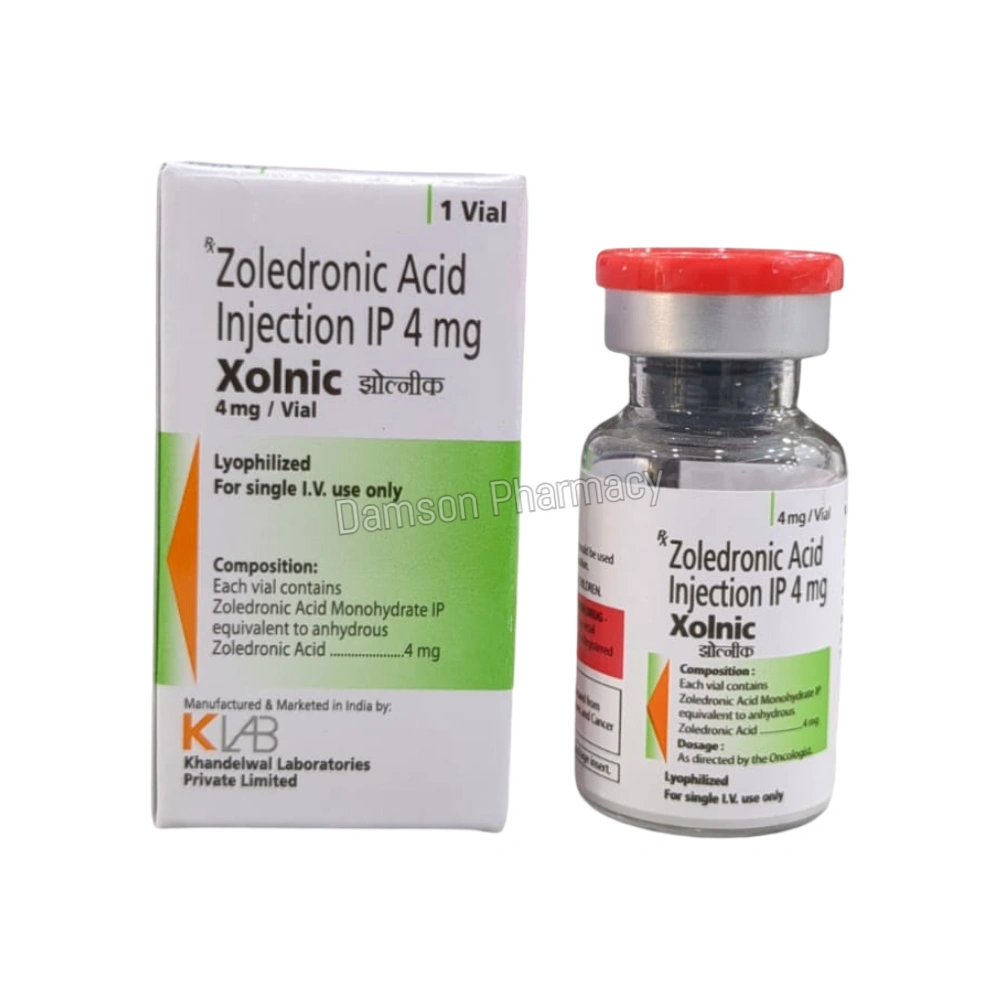
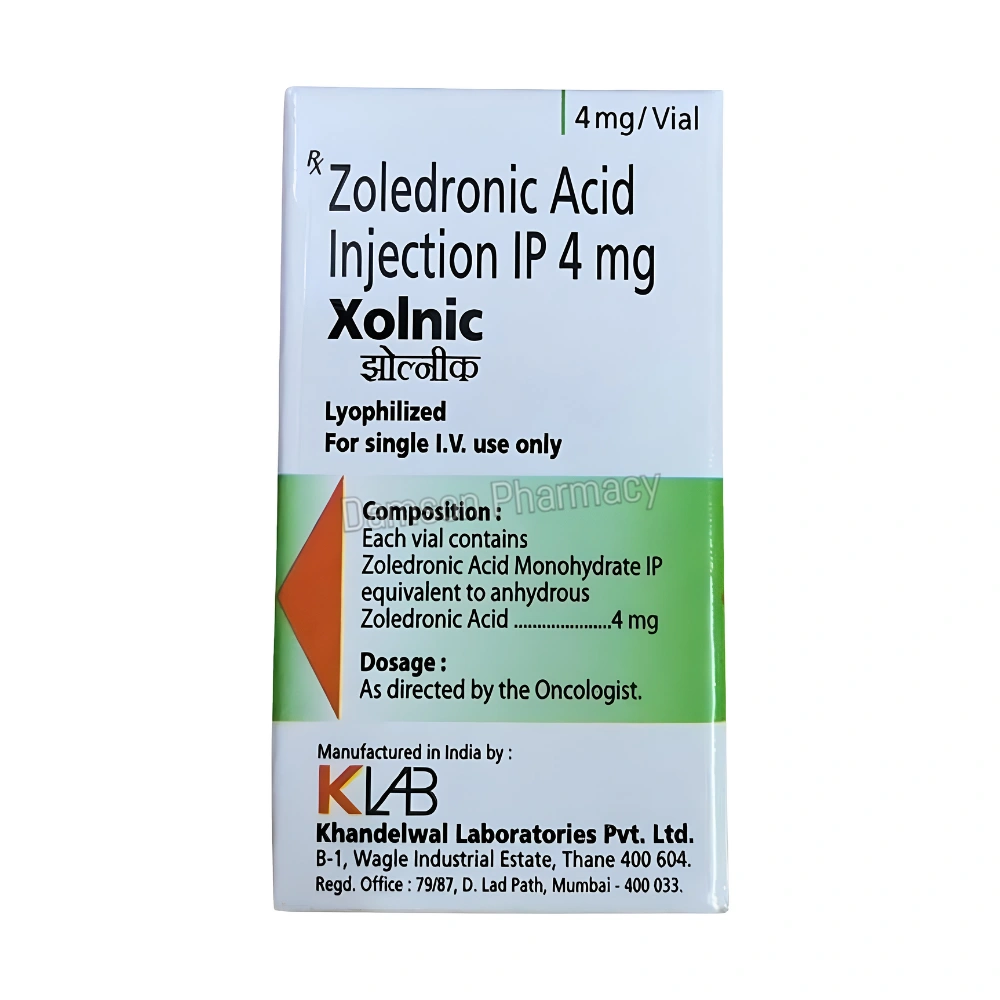
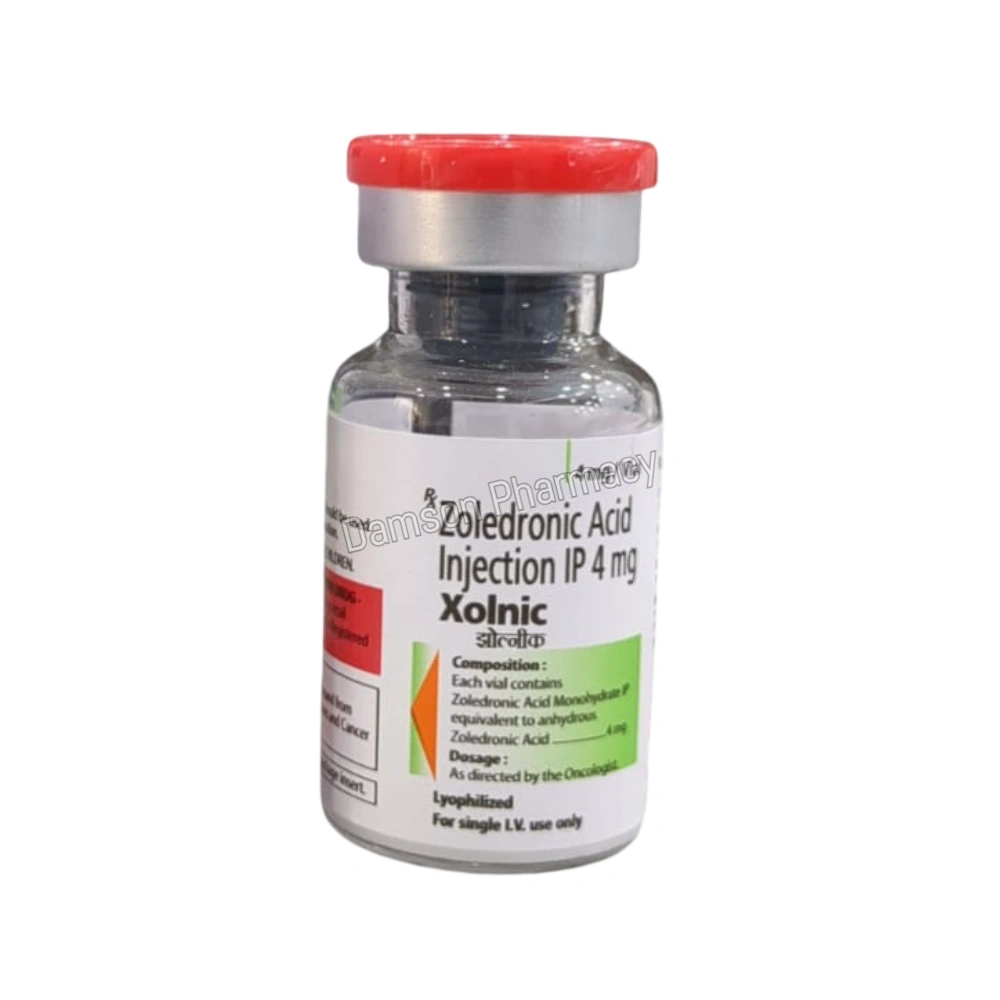

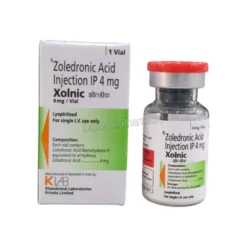
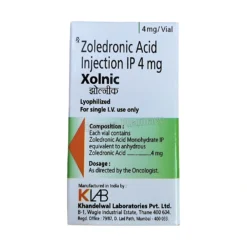
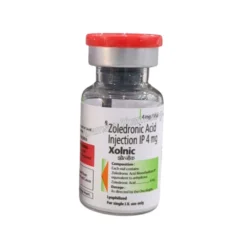
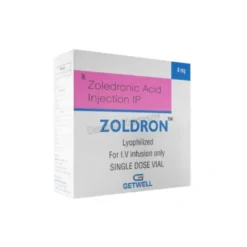


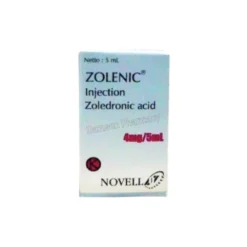
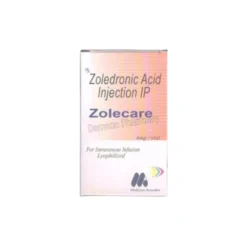
Reviews
There are no reviews yet.